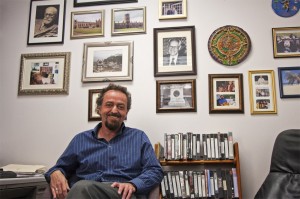Bringing a light side to a serious subject
Kimberly Morice
-Staff Writer-

On the second floor of Social Science sits an office with a black leather massage chair in the corner and many pictures hanging on one of its walls. Among the frames is a photo of Sigmund Freud, directly above it hangs a photo of Jimmy Buffet sitting in a lawn chair on the beach. The office’s owner, STLCC-Meramec psychology professor Terry Cooper, Ph.D. turns from his desk and points at the coinciding photographs of two of his inspirations.
“This is kind of crazy, but this is very much an expression of both sides of my personality. The humorous, playful and fun-loving side of Jimmy Buffet and his music has become as much a part of my personality in some ways as the far more serious side of Sigmund Freud, and I have no need to get rid of either side of my personality,” Cooper said.
Cooper, who is known as “Coop” to many of his students, has been teaching full-time as a psychology professor at Meramec since 1994; he also teaches part-time at Webster University. Though he has always taught psychology, it was not always in his plans.
“I decided as an undergraduate that I was going to major in philosophy and I minored in religious studies,” Cooper said. “I actually got interested in psychology kind of through the back door. Although my first favorite professor was a psychology professor.”
Over the last several years, Cooper has become interested in psychoanalysis. He is in his third year of a four year psychoanalytic program in Los Angeles, which is part of his training for becoming a psychoanalyst.
“I’ve gotten more and more interested in psychoanalysis, particularly contemporary psychoanalysis, because things have really changed a lot since Freud and contemporary psychoanalysis is a lot more open to different kinds of therapy,” Cooper said.
Cooper inserts a lot of humor into his classrooms; if he feels a lecture is becoming too serious, he will tell a joke or make a pun that makes even himself cringe.
“I think it’s important that professors are human and not some sort of mechanical robots, and that they have a sense of humor and care about students. It is such a part of my personality that I don’t think I could not do it. I can’t tone it down,” Cooper said.
Cooper has had many personal experiences in the field of psychology working as a counselor at a mental health facility. He draws from these experiences in the classroom by telling his students a story for nearly every syndrome and psychological problem.
“The courses I teach here especially need a person who can draw on a background of actually working with people. I mean, when you teach abnormal psychology you probably need to have done some actual clinical work with people,” Cooper said. “The more examples I can use that are relevant to the theory, the easier it is to grasp the theory.”
Compared to other professors, who mostly refer to the textbook while teaching, most students find Cooper’s personal experiences to be more helpful while learning the subject.
“I can sit there and talk about what the textbook says about a particular clinical problem, or I can look back on times in which I remember doing consultations in the hospitals or being called into emergency situations in which there were times where, quite frankly, I didn’t know for sure if I was doing the right thing,” Cooper said. “You’ve got to trust your intuition and you’ve got to get as much supervisory help as you can, but I look back on those times as very important in the way I look at theory and that kind of thing.”
Cooper takes inspiration from many people in the field of psychology; among them are Carl Rogers, Heinz Kohut and indirectly Sigmund Freud himself.
“I think that even if you think that Freud was dead wrong, you can appreciate his genius. Because there was nothing he didn’t look at. He looked at everything and he had an answer for everything — it may be wrong, but he had an answer,” Cooper said.
Cooper stays in touch with many of his students and periodically has letters of recommendation to fill out for former students who are applying to Ph.D .programs at various universities across the country.
“That is one of the most rewarding aspects of what I do,” Cooper said. “People often remember their start. They remember how the whole thing began, just like I look back on my mentor, Don Browning, as being so instrumental to me in making me believe I could go as far as maybe I wanted to go.”












